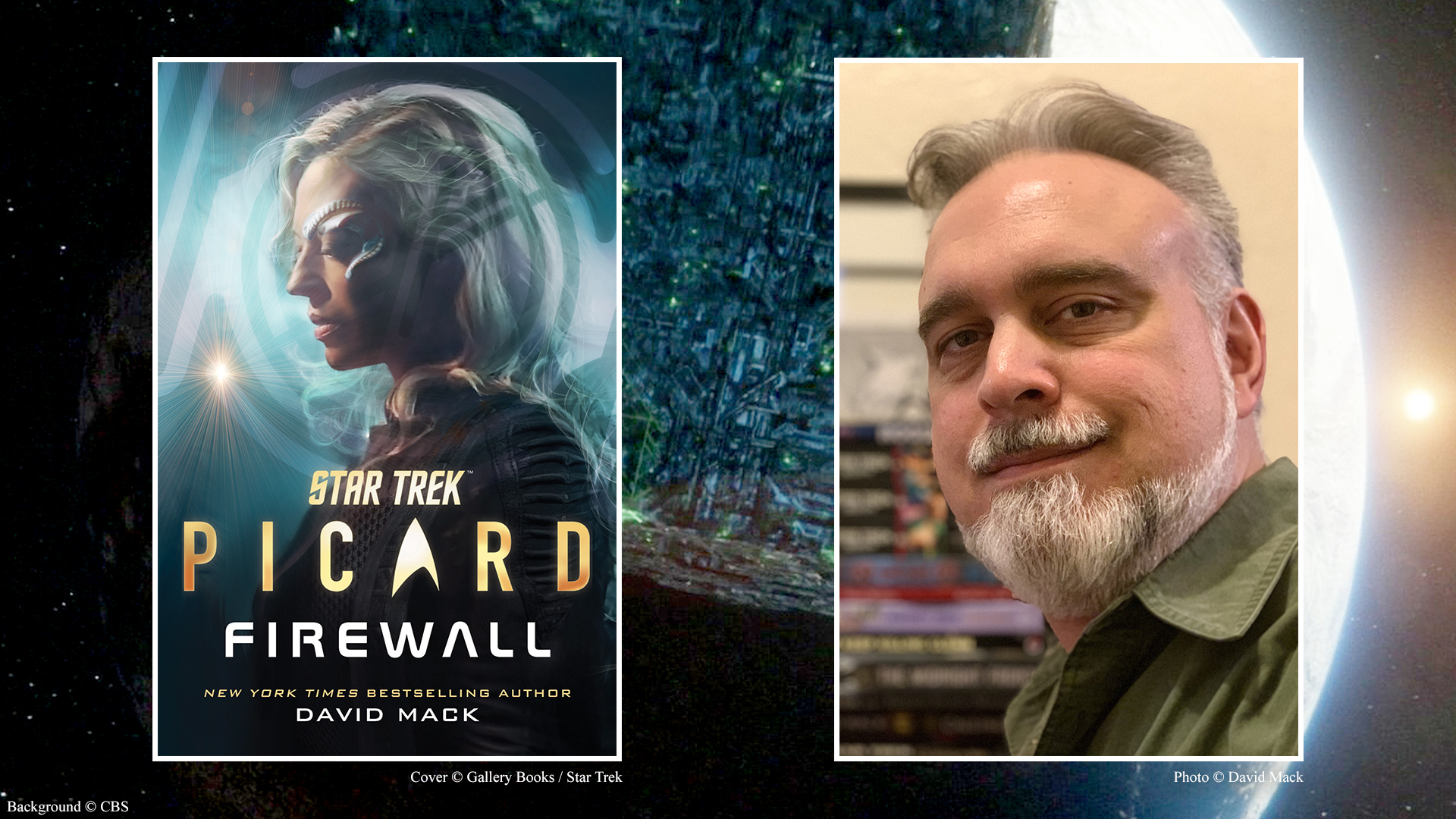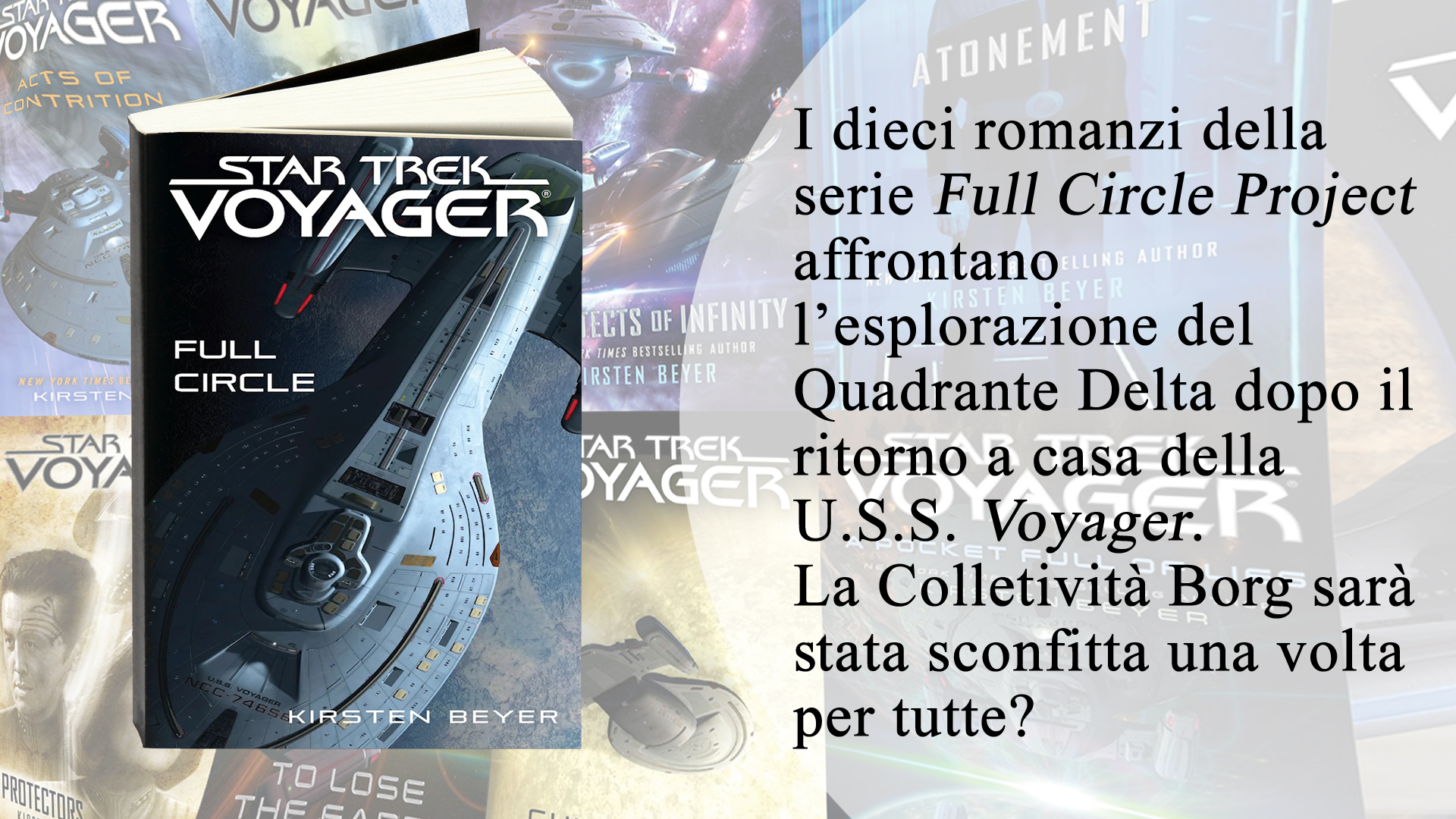[INTERVIEW] Q&A with DAVID MACK about STAR TREK, his new NOVEL and FUTURE PROJECTS

Mack’s writing credits span television (for example, for episodes of Star Trek: Deep Space Nine), film, and comic books. He also has worked as a consultant on the animated television series Star Trek: Lower Decks and Star Trek: Prodigy. In June 2022, the International Association of Media Tie-in Writers honored him as a Grandmaster with its Faust Award.
His most recent publications include Harm’s Way, a Star Trek: Vanguard / Star Trek: The Original Series crossover novel, and several new works of original short fiction. Coming in February 2024 from Mack will be a new Star Trek: Picard novel titled Firewall, centered on the character of Seven of Nine.
And it was precisely on the occasion of this latest Star Trek-themed release that I had the chance to interview David Mack: as a big fan of his novels, I couldn't pass up the opportunity to host on my site one of the authors I appreciate the most within the narrative landscape related to the Star Trek franchise.
Below, the complete interview! If you would like to read it in Italian, you can CLICK HERE. For the first interview to the author, CLICK HERE.
First question: Professionally, who
are you in Star Trek?
I am probably best known to most Star Trek fans as a writer of Star Trek novels and short fiction. However, I also have written for Star Trek on television (for Star Trek: Deep Space Nine) as well as for comic books, video games, reference works, audio drama, live theater (for a European touring production of Trek music that was canceled because of the outbreak of the covid epidemic), news, and academic analysis. After 29 years (so far) of writing professionally for Star Trek, the only medium in which I’ve not yet written for Trek is feature film.
With which Star Trek
character do you most closely identify?
That’s a difficult question to answer. I see bits of myself in so many of them that it’s hard to choose just one. I remember being the brainy kid in school, like young Wesley Crusher; I’ve struggled with anger issues, as Worf did early on. I was bullied and ostracized as a young boy and as a teenager, so I sympathize with the way Spock was treated during his youth on Vulcan. If I were to narrow it down to one of those three, I would have to say Spock, if for no other reason than because he was the character I met first, and the one I idolized for most of my life.
As an idea, what does Star Trek
mean to you?
I think of Star Trek, philosophically, as a vision of hope for humanity’s future. It acts not only as a mirror that enables us to reflect on the world we presently live in, but as a window through which we can glimpse the better future that awaits us if and when we choose, as a species, to move beyond our differences and build a better world together, in peace.
In our previous interview, we
talked about you being the Star Trek creative consultant for Star
Trek: Prodigy. Is there a character in Prodigy that you are
particularly fond of?
From the beginning, I’ve had a special affection for Gwyndala. Her character arc has a lot of depth to it. She turns against her father to help the rest of the principal characters escape, and she embarks on a journey of atonement for the things she did while in her father’s service. I’m always a sucker for a good tale of a flawed character on a journey of redemption.
In your latest novel, Firewall,
you somewhat ventures into the characters of the Star Trek: Picard
series. Are there any secondary characters in Picard that you would like
to see developed more in the future?
I think there could be stories yet to tell about Laris, the ex-Tal Shiar agent turned refugee. I could imagine a fun prequel story from her years in the Tal Shiar, or perhaps a story set after the end of Picard season three, in which Laris is recruited by Starfleet Intelligence to undertake some mission for which she alone is qualified.
Is there a Star
Trek character that you would like to explore in greater depth in a future
work?
Other than Laris? It might be fun to dig into the psyche of the new version of Christine Chapel from Star Trek: Strange New Worlds.I was intrigued by the glimpses we got of her and Doctor M’Benga during the Klingon War. That might provide the basis for a poignant novel about the emotional costs of war on the healers, and what it means to turn a healer into a soldier.
About Laris, Chapel and the stories
still to be written: would you like (or are you going) to write them?
Not unless the publisher hires me to write them. At this time, I am not under contract to write any books.
The fandom is hoping for a new
series, a sequel to Star Trek: Picard focused on the adventures of the Enterprise-G.
What stories would you like to write for this series?
There’s no way I can answer that without seeing what form such a series takes. I’d have to know who all of the primary characters are, as well as the nature of their relationships and their respective backstories, as well as the overall tone of the series and its general premise. Just being on a ship called Enterprise is not enough on which to build a story.
Where did the idea for your new
novel Firewall come from? Why a story about Seven of Nine and not
another character?
The editors asked me specifically to write a novel about how, why, and when Seven joined the Fenris Rangers. In episodes of Star Trek: Picard, Seven spoke of being turned away by Starfleet, a rejection that caused her to go “full Ranger.” For a number of reasons, I concluded that this likely happened not very long after Voyager returned from the Delta Quadrant. As for why this is a story about Seven — every story has to be about someone. This one is about her.
Is Firewall a standalone
story?
Yes. It is what in literary circles would be called a Bildungsroman. That’s a fancy German word for a coming-of-age tale. Most of the story takes place over the span of several weeks in 2381, roughly three years after Voyager’s return from the Delta quadrant. There’s no need for anyone to read any books before this one. Those who have seen the Voyager series finale and season one of Star Trek: Picard know all they need to know to jump in and enjoy this story. And it doesn’t leave any cliffhangers; when a reader reaches the end of the book, the story is done.
Can you tell us what we can expect
in Firewall?
Seven goes on a journey of self-discovery, to find out who she is, what she wants to be, and what it will take to make her own way in the galaxy. Along the way she must contend with people who would take advantage of her, and she soon makes a new friend who helps her join the Fenris Rangers. This proves to be a fateful choice for Seven: as a Fenris Ranger, she confronts a new enemy whose brutality, cruelty, and unpredictability confounds her; she witnesses evils and atrocities that break down her last psychological barrier to her long-suppressed human empathy, and the experience nearly overwhelms her; and, last but far from least, Seven meets a fellow Ranger, a Trill woman named Ellory Kayd, who becomes the first great love of her life.
What else do you have coming out
other than your work for Star Trek?
In April of 2024, an essay I wrote about the professional experience of writing Star Trek tie-in novels will be published by McFarland as part of a collection of new essays titled Strange Novel Worlds, edited by Caroline-Isabel Caron and Kristin Noone.
In the fall of 2024, I expect to see the publication of two new original short stories, each in a different new themed anthology. One is titled “Bockscar,” and it is slated to be part of the anthology Combat Monsters, edited by Henry Herz and published by Blackstone Publishing. The general idea of that anthology is tales of real battles or actions of World War II re-imagined to involve monsters, mythological creatures, or other fantastical beasts.
The second original short story, coming in November of 2024, is “Living by the Sword,” a tale of longing and regret with a science-fiction twist, in the new space-western anthology Last Train to Kepler 283-c, edited by David Boop and published by Baen Books.
I’m also tinkering with a new original novel idea, but it’s not yet at a stage where I can discuss it publicly. Perhaps someday soon, if I can get my brain back to work on it.
What are your future projects in
the Star Trek universe? Are you working on any new comics, novels, or
other projects?
I’m hoping to secure a new Star Trek book deal for something to be published in 2025 or 2026, but while I’m waiting for that miracle to occur, I have four pieces of new original Star Trek short fiction coming up in four consecutive issues of Star Trek Explorer magazine.
In issue 11, coming in April, look for my Star Trek: The Next Generation-based story “Dignified Transfer.” In issue 12, subscribers can expect to find my Original Series-inspired story “Memoriam.” Issue 13 is slated to present my Wesley Crusher tale “Family History.” And I hope to end 2024 with a bang, via my Star Trek: Picard-inspired action tale “Freeblade.”
***
You can read the interview with David Mack translated
into Italian by CLICKING HERE.
You can find our interview on the release of the novel Harm's Way by CLICKING HERE.
You can purchase David Mack's new novel, Firewall, directly from Amazon by CLICKING HERE.
Keep an eye on David Mack's website to keep up to date with his future work. You can find it HERE. Also visit his FACEBOOK and BLUESKY (a new social network alternative to X) profiles.




Commenti
Posta un commento